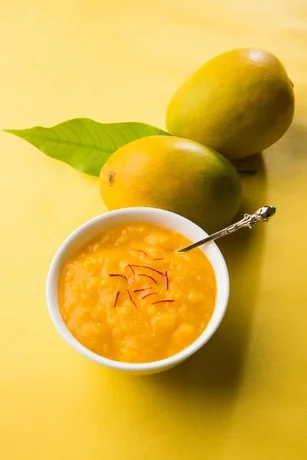Breastfeeding & Baby Feeding
Nutritional Value, Benefits, and Recipes of Mango for Babies

Mango is a juicy, tropical fruit rich in essential nutrients and perfect for babies starting solids. Its sweet taste, smooth pulp, and easy digestibility make it ideal for young children. It’s also known for boosting immunity and promoting digestion. Let’s explore mango for babies benefits, proper feeding tips, and delicious recipes you can try at home.
When Can Babies Start Eating Mango?
Babies can eat ripe mangoes after six months, once they start eating solids. Begin with a smooth mango puree. You can gradually add mango to other mashed fruits like banana or papaya. For older babies, serve tiny mango chunks or offer wedges they can hold.
Always remove the peel. Mango skin is slippery and may increase choking risks. Let babies try sucking on the mango seed under close supervision to soothe gums during teething.
Quick Tip: Roll mango slices in coconut shreds for better grip during self-feeding.
Nutritional Value of Mango for Babies
Mangoes provide hydration and key nutrients for your baby’s healthy growth. Here’s what 75g of frozen mango typically offers:
- Energy: 45 Kcal
- Fiber: 1.2g
- Vitamin C: 27.3mg
- Vitamin A: 40.5µg
- Potassium: 126mg
- Folate: 32.2µg
- Iron: 0.12mg
These nutrients help boost immunity, vision, and overall growth. Mangoes are also rich in antioxidants and are energy-dense, making them a great early food.
Mango for Babies Benefits
Let’s look deeper into how mango supports your baby’s health:
- Supports Healthy Growth
Mangoes contain vitamin A, which is essential for eye health and skin development. This vitamin also aids the immune system. - Aids Digestion
Mangoes contain fiber that softens stools and prevents constipation. Include it in your baby’s regular diet to support smooth digestion. - Builds Strong Immunity
Thanks to vitamin C and antioxidants, mangoes fight off infections. They may reduce inflammation and support your baby’s immune health.
Note: Overeating mangoes may cause gas due to high natural sugar content. Serve in moderation.
How to Choose and Store Mangoes
Follow these steps to ensure your mangoes stay fresh and safe:
- Pick plump, firm mangoes with no bruises or black spots.
- Smell the mango; a sweet scent indicates ripeness.
- Rinse mangoes under cold water before peeling or cutting.
- Store ripe mangoes in the fridge and consume them in 1–2 days.
- Freeze mango cubes for up to six months in BPA-free containers.
Frozen or canned mangoes (packed in juice, not syrup) are fine substitutes when fresh ones aren’t available.
How to Feed Mango to Babies
Mango’s soft texture makes it versatile. Here are safe ways to include it in your baby’s diet:
- Start with smooth mango puree. Blend ripe mango with breast milk or formula for added consistency.
- Avoid dried mango for babies under one year. It poses a choking risk and contains added sugar.
- Introduce new mango-based recipes slowly. Begin with 1–2 teaspoons and increase gradually.

Watch Out: Mango allergies are rare but possible. If your baby develops a rash, vomiting, or wheezing, consult a doctor.
Healthy and Tasty Mango Recipes for Babies
- Mango Puree
You need: 1 ripe mango
Steps: Blend peeled mango into a smooth puree. Add milk if needed and serve fresh. - Mango and Banana Mash
You need: ½ banana, ½ cup mango
Steps: Mash both fruits together with a fork. Serve immediately after mixing. - Mango Popsicles
You need: 2 cups mango, 1 cup yogurt, 1 tbsp raisin puree
Steps: Blend all and freeze in molds for four hours. - Mango Pineapple Smoothie Bowl (For 12+ Months)
You need: Mango, banana, pineapple, quinoa, almond milk, granola
Steps: Blend ingredients. Pour into a bowl and top with fruits and coconut flakes.
Quick Fact: Use nut powder instead of granola to avoid choking in babies under 12 months.
Final Thoughts on Mango for Babies
Mango is a safe, healthy, and delicious fruit for babies starting solids. It’s full of fiber, vitamins, and energy. By using age-appropriate recipes, you can introduce mango in fun and tasty ways. Remember to watch for allergies, choose ripe mangoes, and feed in safe textures.
Ready to discover more healthy food tips for babies?




